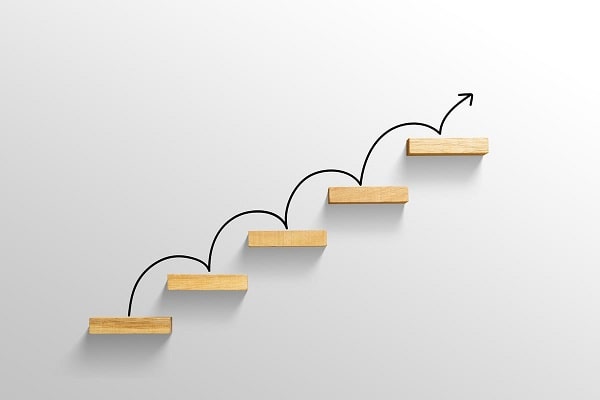
During college I spent 4 to 5 hours a day singing, honing my craft. I studied history, learned theory, and practiced vocal skills.
My music knowledge and abilities were constantly being evaluated by my professors. Incremental improvements were required of me to maintain college enrollment and keep my full music scholarship. This music study taught me a system that allows me to learn music quickly and perform at a professional level continuously.
This was the first time for me to be led by an improvement strategy system that encouraged incremental improvement.
In my previous life as Head of Footwear Product Development for Adidas International, incremental, and constant improvements were woven into our DNA with every action that we took. We developed 100’s of new creations every quarter.
Some designs were evolutionary with minor adjustments to existing designs. Other creations were totally new technology and materials with fresh design lines. This Adidas leadership experience is an early example of where I applied an improvement strategy system that encouraged incremental improvement gains.
In 2003, British cycling was simply terrible. The UK team was so bad that one bicycle manufacturer refused to sell them gear. Then, something miraculous happened with the cycling team.
The team hired a new coach, in Sir Dave Brailsford. Previous coaches implemented goals and guaranteed success. However, they all failed to deliver the goods. This new coach was different. He did not come in with goals and promises of success.
Sir Brailsford instead committed to a strategy he referred to as "the aggregation of marginal gains." Brailsford said, “The whole principle came from the idea that if you broke down everything you could think of that goes into riding a bike and then improve it by 1 percent, you will get a significant increase when you put them all together.”
By doing simple 1 percent improvements, remarkable things can happen. It is not the goal. It is the system that matters most. Implementing the aggregation of marginal gains system into British Cycling was a game-changer. Check out their change in fate and their accomplishments over the past 2 decades.
The Tour de France is the toughest competitive cycling event. It is a 21-day race that is exhausting and takes all the strength and stamina these athletes can muster. Since it is a 21-day event, this means that they must sleep in 21-different hotels.
Everyone knows that proper rest is paramount to peak performance. The coach did not want to leave anything to chance. So, Brailsford carried on the team bus, custom-designed mattresses, and pillows for each rider. This allowed each rider to the best quality of rest each night.
While this single detail made not sound like much but making little adjustments every day add up to significant improvements. The little things do matter.
Brailsford said in a 2015 interview with Harvard Business Review. “Perhaps the most powerful benefit is that it creates a contagious enthusiasm. Everyone starts looking for ways to improve. There’s something inherently rewarding about identifying marginal gains — the bonhomie is similar to a scavenger hunt.”

Briefly we coach individuals and teams on a new way to set their goals. Our system consists of three parts. We call these parts, Process Goals, Product Goals, and the Ultimate Goal.
The daily tasks we call Process Goals. These goals are the things that we spend our time on every day. It could be creating marketing content, e-mailing potential new clients, or attending networking events.
By doing targeted Process Goals, we can create the Product Goals that our client wants. These Product Goals are the different services we provide or the several types of widgets we have for sale.
Finally, we come to our Ultimate Goal. This is usually a single annual sales figure or a specific number of widgets that we want to sell that year.
Our daily tasks do matter. It is where we spend most of our time. And it is where we can make the most improvement. I propose that those who incorporate “aggregation of marginal gains system” into their organizations will see amazing results.
"What's the ONE Thing I can do, such that by doing it, everything else will be easier or unnecessary?"
Where should one begin to implement “aggregation of marginal goals system” into their companies? Here’s one idea. Gary Keller in his book, The ONE Thing proposes, "What's the ONE Thing I can do, such that by doing it, everything else will be easier or unnecessary?"
Think about that for a minute. What’s the ONE Thing that you could do in your organization? It will be different for everyone. Gary further believes that success is found in doing what matters most. That’s where you should start.
Personally, I have the desire to write more blog articles. To accomplish this, I have decided to do one thing. I will make a habit of writing every day. Author James Clear advocates that the way to build habits is to try and get just one percent better each day. There is that one percent idea again.
If I write every day, I should improve my writing skills. I would like to express principles that I coach more simply. Albert Einstein said, “If you can’t explain it to a six-year-old, you don’t understand it yourself.”
If you need additional assistance, our personal development coaching programs help individuals reach their full potential in life and work. Reach out to us.
Here are links to other blog posts that you might have interest in.
How Career Maintenance is More Effective and Less Expensive Than Career Repair
How Will a Hybrid Workforce Impact Your Culture?